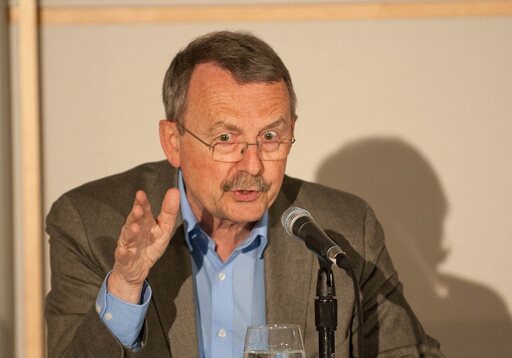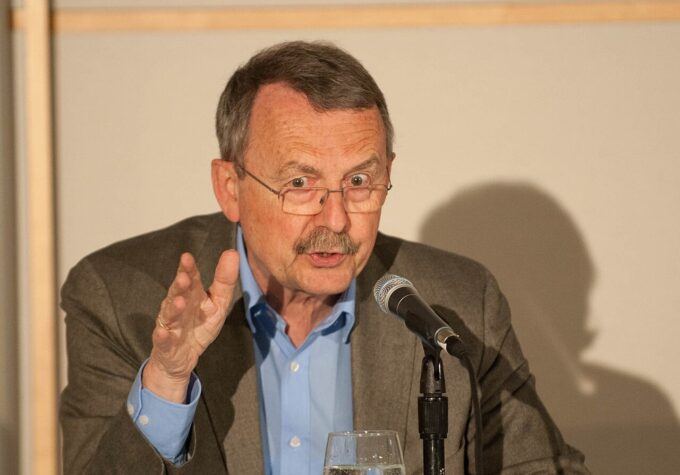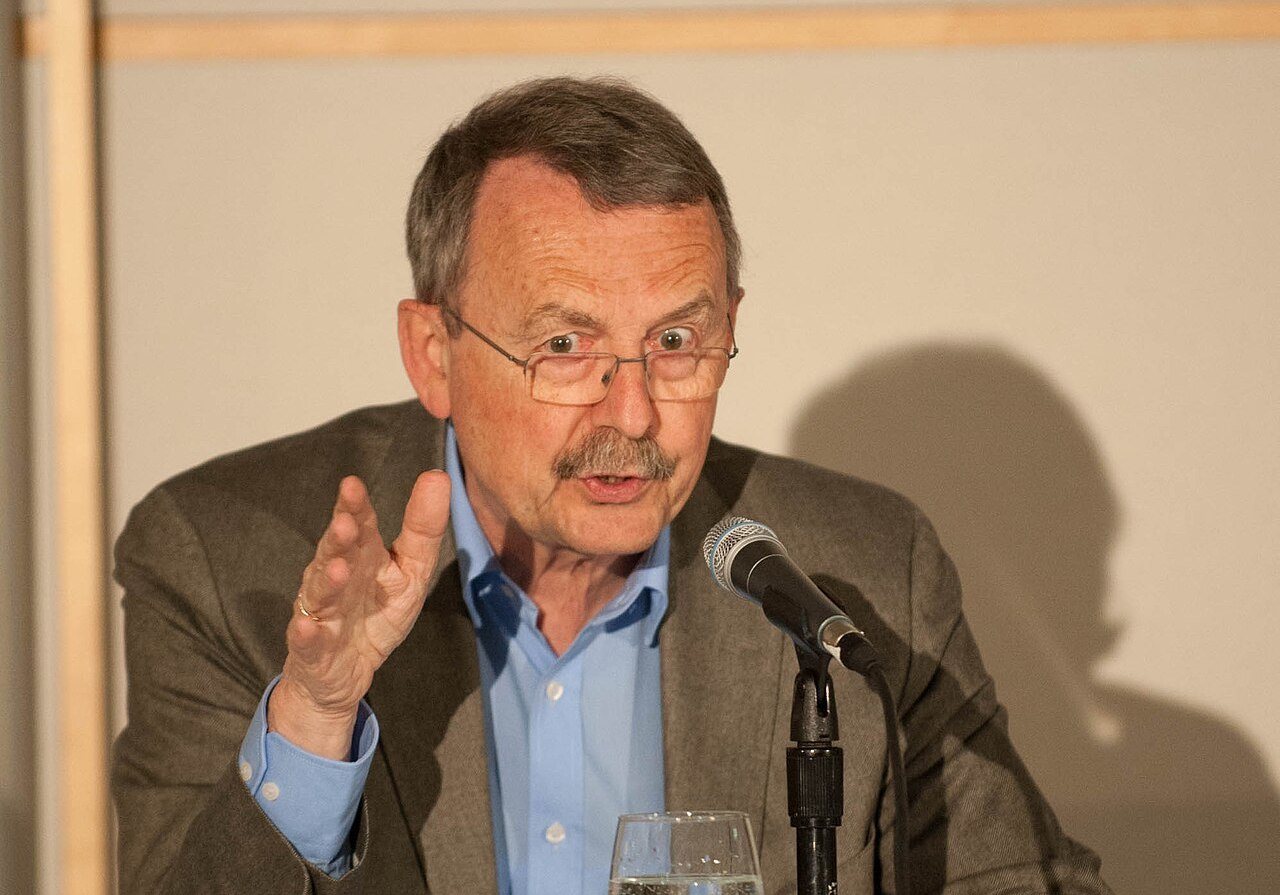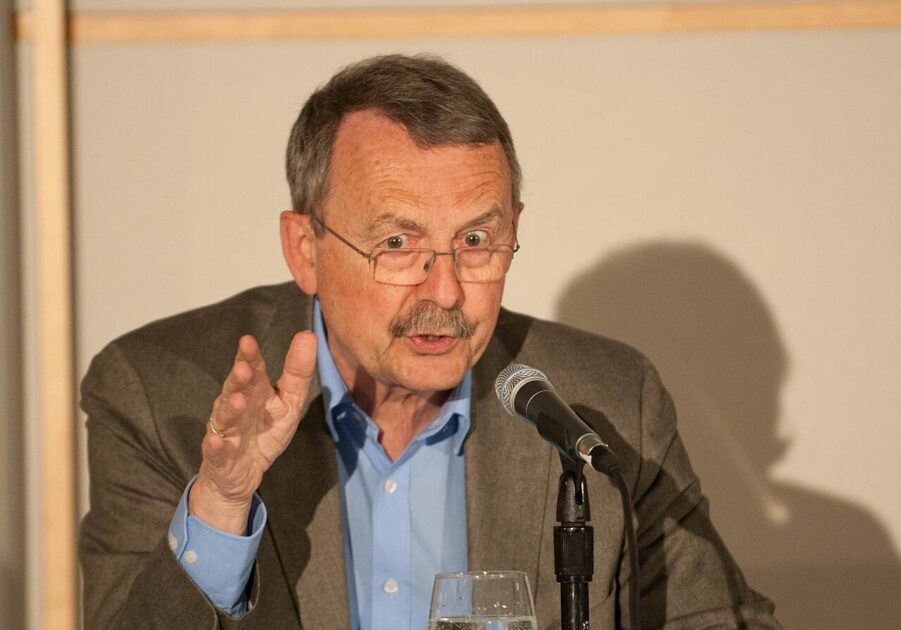How Will Capitalism End: Reflections on a Failing System – A Lecture by Wolfgang Streeck. Tuesday, April 4, 2017. Photograph Source: Center for the Study of Europe Boston University – CC BY-SA 2.0
Wolfgang Streeck, director emeritus of the Max Planck Institute for the Study of Societies in Cologne, is in the front ranks of Europe’s social thinkers, having come out with some of the most penetrating analyses of the crises of neoliberal economics and the ills of neoliberal society over the last 30 years. No stranger to controversy, he has criticized the technocratic elites in Europe and the United States for placing adherence to so-called “universal values” rather than the democratic process as the basis of the right to rule, called for an end to Europe’s subjection to the United States, dismissed the Russian threat as a fiction manufactured by the Baltic states, and called for the transformation of Europe and the global order into systems of small states. Though a man of the left, he has distanced himself from both the German Social Democratic Party (SPD) and Die Linke (The Left Party) on matters of peace, immigration, and social policy and become identified as a strong supporter of the party (BSW) of the controversial Sahra Wagenknecht in the lead-up to the 2025 Bundestag elections. His latest book is Taking Back Control? States and State Systems after Globalism (2024)
Trump: Purveyor of Chaos and Uncertainty
WB: Let me turn to another issue. What do you think is going to happen with Trump and Europe?
WS: Before I address that issue, let me say that we have, in Germany, 40,000 American troops, the same as Okinawa. In addition, we have an unknown number of American nuclear warheads stationed in Germany. In Ramstein and Wiesbaden, we have the two most important command centers of the American military apart from the Pacific. Anything that is being done in the Middle East is being done out of the American military command in Wiesbaden, Germany. So, German foreign policy must always be seen in this perspective. And we have a political elite that over decades has been trained that Germany on its own cannot do anything unless the United States supports us.
Now to Trump, I’ve never been in a situation where it’s so difficult to make predictions. As a leader this man is a source of chaos—chaos means you don’t know what’s going to happen next. For this reason, one needs to look at the deep state in the United States. Trump is sitting on something. That something is the biggest military in the history of mankind and the biggest espionage and sabotage operation. In Europe, the two former fascist countries that were defeated in the Second World War, Germany and Italy, are still basically occupied by the United States. By the US military. Will they leave if Trump tells them to? I don’t think so. What they’ve dug into the ground in terms of technology, you can’t even speculate on this sort of thing. But there must be billions and billions worth of high technology on German soil, or underground. Will they pull it out? Career opportunities in the U.S. military have to do with their 750 military bases around the world. 750! If Trump is thinking about making “America Great Again” by rebuilding American society, finally building decent high schools and finally getting a decent health care system in place and ending the drug epidemic, then he would have to bring these people back into the real life on the American ground. They would have to learn to be decent policemen or decent doctors. Can you imagine this? This is what I think what Trump will have to get done to keep himself in office if MAGA is about the United States as a society rather than an empire.
WB: Let’s talk a bit about the deep state and how there might be dissatisfaction there with Trump’s policies. Do you think there are people in the US military who would be willing to move against Trump?
WS: It’s hard to think about someone in the U.S. military who would want to become a dictator. But J.D. Vance might fit the bill. To me he seems like someone who’s both very intelligent and absolutely ruthless. There’s a procedure in the American constitution, the 25th Amendment, to declare the president incapable. The procedure has to be started by the vice president. If he can convince the Speaker of the House and the Senate Majority Leader that Trump is mentally incapable, according to the constitutional procedure for removing the president from office if he’s no longer mentally fit, he might do it. Then he will be president.
Will Capitalism Again Reorganize Itself through War?
WB: Do you see the relations between Europe and the US as irreversibly deteriorating?
WS: When Trump came in during his first term and also at the start of his second term, there was this sense that European countries must have a common foreign policy and security capacity because the United States will leave. Then in a very short time, we had the NATO chief sucking up to Trump. From one extreme to the other. My view is that we need to have something different from both a United States of Europe and from Europe as a trans-Atlantic extension of America. In recent writings I have tried to point out the difficulties involved in both extremes, in order to really understand what Europe is and where it should go.
But before discussing that, let me share my biggest nightmare, which is capitalism reorganizing itself through war. Capitalism, in fact, has again and again organized itself through war. Capitalism was reorganized when the Dutch took over from Genoa and the center of capitalism moved from the Mediterranean to the Atlantic, then the British defeated the Dutch and the center moved to London, then came the First World War which destroyed the old quasi-feudal European empires, replacing them with the modern nation-states, after which came the chaos of the 1930s, when Britain could no longer maintain world order while the United States still refused to do the task, leading to the Second World War, which saw Germany and Japan become allies, each seeking their own “zone of influence,” modeled after the Monroe Doctrine, then the postwar settlement—the second after 1918—which gave rise to the bipolar order and the colonial wars of liberation, and finally the end of the Cold War—without bloodshed only because of the wisdom of Gorbachev—making the United States the new hegemon, bringing in three decades of neoliberalism—George H. W. Bush’s New World Order—which is now in ruins. Around which power, or powers, will capitalism reorganize itself this time? And will it, once more, be reorganized by war? There are just two candidates, the United States and China.
What is frequently being discussed in the United States is the scenario Thucydides gives when trying to account for why Athens, the leading power of its time, lost the Peloponnesian War. As he recounts it, Athens was defeated by Sparta because it didn’t strike early enough, when it still had the strategic advantage. It watched the new hegemon rise until it was too late, Sparta having become too strong to be defeated. Note the ambivalence in Trump’s posture in relation to China. Sometimes he sounds very warlike, sometimes you’re not so sure. If Trump told an American military planner today that 10 years from now the United States would probably have to go to war with China, the answer might be that this would be too late because the Chinese would by that time have become too strong. So, the army might prefer to do the job now. Europe would inevitably be dragged into this conflict, unless it takes steps now to move away from its dependence on the United States.
Europe’s Crisis and the German Question
WB: So where is the thinking among European elites on this question?
WS: Since German unity in 1990, the rhetoric was always that Germany must accept its responsibility and act as the leading country in Europe. What this meant, however, was that Germany would pay the costs of keeping Europe together, but that being the leader did not mean telling others what to do. And that led to Merkel in particular, always hiding behind other countries, especially France.
The present German government, under Friedrich Merz, the new chancellor, has changed the tone. Now the rhetoric is about Germany as Europe’s most powerful nation. What this really means is that they actually want to lead, not just to pay. This makes for conflict, certainly with France. For the French always saw the Europe of the European Union as being led by a tandem, with them steering and the Germans sitting at the back. Now, things seem have to become different. Recently, someone suggested that one reason why the current German government has taken on such a lot of debt is to preempt Italy and France from getting their way by allowing the EU to take on debt on their behalf and with the Germans providing the de facto collateral. If the EU would now acquire debt on a large scale, interest rates would become prohibitive. Generally, I think that the new German leadership under Merz now aspires to a leading role of Germany in EU and Europe beyond just picking up the bill, basically out of political necessity, to avoid having to act in the interest of others instead of its own interest. In a longer perspective that points to Germany as the hegemon of the Western European state system in a multi-polar world.
My view, as I have said several times, is that Germany does not have the military capacity to support this kind of project. Since the 1960s, when France set up the Force de Frappe, the French governments have always had a deal in mind along the following lines: their nuclear force is expensive, so if we promise to extend our nuclear deterrence to the defense of Germany, Germans can pay for some of it. Since they don’t and can’t have a nuclear force, they have enough money to pay for a strong conventional army, the opposite of the French situation. There were several efforts by France to set up a deal like this, and Germany was sometimes willing to entertain something like it, paying part of the costs of the Force de Frappe in exchange for French nuclear protection. But when the Germans asked for the target catalogue for the French nuclear missiles, they heard that targeting had to remain a French prerogative as a sovereign nation. The problem behind this was that most of the targets were in Germany, since the idea was to stop the Russian army from getting to France, and where you stopped them was and could only have been in Germany. So, they never even came close to a deal, and this reinforced the dependence of Germany on the United States.
Interestingly, the new floor leader of the CDU in the Bundestag recently raised the question of whether Europe would need a nuclear umbrella of its own and where Germany would fit in this. If my memory serves me right, this had not been discussed since the 1960s. He repeated in an interview that Europe would need its own nuclear capacity but left unanswered who would be in charge of the nukes, saying it was still a problem that needed a solution and going on to propose something completely ridiculous like in the likelihood of war, countries could draw lots. Can you imagine giving Giorgia Meloni or Marine Le Pen the nuclear trigger? So, the implication is, if you can’t have a European nuclear weapon, then it has to be a national nuclear capacity for Europe, and if you don’t want it to be a French one, then Germany is the obvious candidate to develop this.
Is Russia the Enemy?
WB: Let me go to the question of Russia. Is Russia the enemy?
WS: No, I don’t see that. The official rhetoric in Europe is that Russia is the enemy, and that in five years’ time, the Russians will be ready to march on Europe. Now this is a picture that is above all spread by the Baltic states. The three Baltics countries are very small. They need someone else to fight their wars for them, and this can only be the Germans. They had tried this alliance in the last world war, and it did not end very well for them. They, in fact, wanted German protection so much that they armed several SS regiments fighting Russia under German command and assisted the Nazis in the persecution of the local Jewry. Very much like Ukraine.
Realistically, it seems totally ridiculous to think that Putin would want to conquer Germany or any other West European country. In principle they can sell gas and oil and other resources to the West Europeans and prosper. Why should they want to rule Germany or, for that matter, Finland, if they have a hard time ruling their own country?
One reason why the Baltics are so excited is that they have sizeable Russian minorities that some of them treat very badly. The tensions with Russia might be more manageable, without these immense preparations for war, if the Russian minorities would be given full citizenship and language rights and federal autonomy. That would mean they would no longer call on Moscow to help them against their governments. The worse they treat their Russians, the more Moscow might feel forced to do something for their compatriots. It is up to the Baltic states to decide how much pressure to put on their Russian minorities so that at some stage they will turn secessionist or irredentist. Instead there are wild dreams about getting the West to defeat Russia for the benefit of the smaller nations on the Russian periphery. For example, Kaja Kallas, the former Prime Minister of Estonia, who is now responsible for the foreign policy of the European Union, is said to have once suggested that Russia should be sliced up into four or five different states, and that only then will Europeans—that is, the Baltics—be safe. This, of course, has been tried before, and it turned out a disaster, including costing the lives of 15 million Russians alone. I claim that a safe life in Europe and in Germany is only possible if we find an arrangement to coexist in peace with Russia on the Eurasian continent, and this is linked to the bigger question of where Europe should go.
Is Another Europe Possible?
WB: And where is that?
WS: Europe is a collection of old societies and states, and the idea that someone can come and merge this into one, either a United States of Europe or as a trans-Atlantic extension of America—that is a very mistaken idea. So, my view is that if we can talk the Baltics out of dragging us into a war with Russia, we need to move into something that is both realistic and good for everyone.
That is, European countries cooperating voluntarily, and extending their freely chosen relations to the rest of the world. Nowadays, logistics are much easier than the 1930s. Germany, or other European countries, could develop amicable relationships with places like the Philippines or South America, or whoever. We could deliver things these countries urgently need, take desalination plants for example, and they could deliver things to us that we need. So, if different European countries on their own initiative, moving together with other European countries that have similar interests, could strike up relations with countries on the Southern side of the world, but also inside the continent of Eurasia, in particular with Russia, that would be something. In this context, we must deal with Russia in a positive way. In a Eurasian perspective, the old idea from Gorbachev to Yeltsin to Putin, “a zone of peace and prosperity from Vladivostok to Lisbon,” if that could be constructed, then we could see the end of our dependence on the United Sates, a dependence which partly depends on resources, since Russia has all the resources the Americans have. There will, of course, be security issues, but there needs to be shared security, with arms control, disarmament, confidence-building measures—none of this is new. If we manage to have a stable system of international security in Eurasia, the Americans can go wherever they want, hopefully in peace. Is that an illusion? I don’t know but if you ask me, what could be a positive legacy for our children and grandchildren, I’d say something like that.
The post Is Another Europe Possible? appeared first on CounterPunch.org.
From CounterPunch.org via this RSS feed






